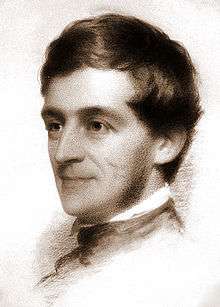Brahma (poem)
"Brahma" is a poem by Ralph Waldo Emerson, written in 1856. It is named for Brahman, the universal principle[1] of the Vedas.
About
Brahma is one of the poems composed by Ralph Waldo Emerson, an American transcendentalist of the nineteenth century. The poem is composed in the form of an utterance- a form which comprises sublime or metaphysical content while adding to it the balladic quatrain-music pattern. (A dramatic form not in vogue, and distinctly different from Browning's dramatic developments). The form, therefore, is the first of its kind to include Oriental poetical material in the Western verse framework. The central speaker of the poem is Brahma Himself, who according to Hindu philosophers of India, is omnipotent, omniscient and omnipresent. The study of the vedantic philosophy, the Gita, and the Katha Upanishad is impressed upon the poem very forcefully. Body is for some certain period of time but within the body of man there is the soul that is the divine spark, eternal, everlasting and never-ending. It is a part of the over-soul who is the supreme God, the super power of the universe.
The first group of American thinkers who observed the non-western philosophy was the transcendentalists. Emerson was the leader and other prominent members of this group were Thoreau, Margaret Fuller, Alcott and Elizabeth Peabody. Transcendentalism opposed the dogmatic concept of belief and urged to think freely. Transcendentalism has the principle that the answer to man's cause is an acceptance of the final liberation – a quality that the biblical religion imposed, and a quality that Hinduism attests as true, ultimately pleasurable and most importantly, to be thought out as a thinking individual- a quality that most appealed Emerson and his decision in giving up his institution of Unitarianism.
Different religions have different beliefs about their deity but the core concern of all is the Brahma, the superpower. Thus, the theme of the poem is universal: The Brahma, the superpower, has many little parts atman, the human, who has to achieve salvation (linkage of atman to the Brahma), but entrapped in Maya, transient one, the physical beauty of the world. One who can overcome the Maya will certainly understand the Brahma i.e the achievement of salvation.
Brahma is the philosophical explication of the universal spirit by that name. The poetic form of elastic quatrain is used to represent the solemn nature of the subject. Throughout, the poem the Brahma appears as the only speaker, sustaining the continuity of the work. That the spirit is the only speaker signifies not only its absolute nature but also its sustaining power, upon which the existence of entire universe metaphorically, the poem is based.
